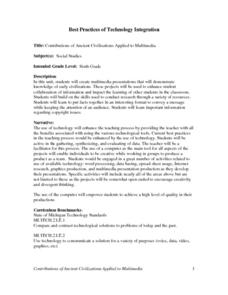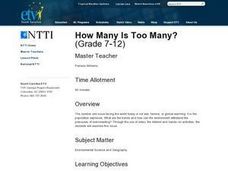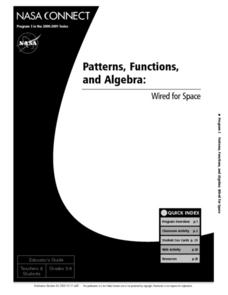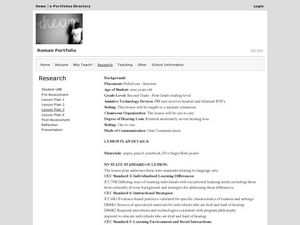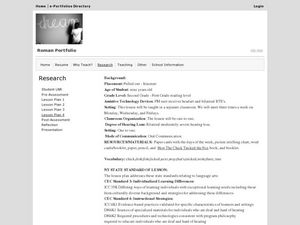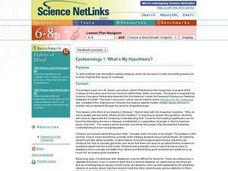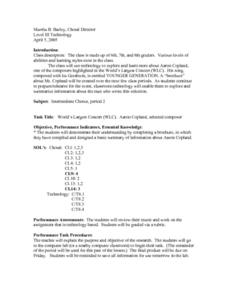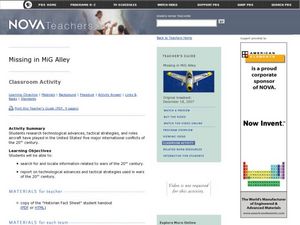Curated OER
Babes in Electronic Toyland
Young scholars read a New York Times article in order to explore the use of handheld electronic devices in schools. They investigate, through surveys and essay-writing, the pros and cons of this technology.
Curated OER
Keyboard Buddies in my Community
Second graders utilize Microsoft Word to create stationery and letters to send to other children in their school building, expressing experiences in their daily lives. As the unit progresses, they create documents to send to other second...
Curated OER
Medieval Madness
Students complete a critical reading of the novel "The Midwife's Apprentice." During their reading, students create several journal responses to the character's situation and transformation. Working with computers, students complete...
Curated OER
Contributions of Ancient Civilizations Applied to Multimedia
Sixth graders complete a long-term unit on ancient and early civilizations. They conduct Internet research, define key vocabulary terms, analyze maps, and create a PowerPoint presentation about a selected early civilization.
Curated OER
Connecting the Dots
Learners consider familiar audio and imaging devices, researching and analyzing the differences between analog and digital versions. They then reflect on which versions of the technology provide a truer record over time.
Curated OER
How Many Is Too Many?
Students explore the population explosion. They view a video depicting the exponential growth of human population. Students research the internet to project future population data. They perform hands-on, multimedia activities to study...
Curated OER
Patterns, Functions, and Algebra: Wired for Space
Students assess how patterns, functions and algebra can assist NASA engineers design new ways of propelling spacecrafts. They explore how electricity and magnetism are replacing the fuel-consuming rocket propulsion. Electromagnetism is...
Curated OER
From Milk to Cheese and Seed to Shelf
Young scholars learn about food production by making cheese, seeing how a seed gets to a shelf, and discussing food safety. In this food production lesson plan, students complete 3 days worth of activities and learn about food...
Curated OER
Toxic Transmission
Students read article, "Toxic Transmission" and discuss technology pollution, specifically cell phone pollution and its ripple effects in other parts of the world.
Curated OER
Understanding and Stay Interested in Reading
Second graders make predictions about reading. In this remedial reading lesson, 2nd graders read a favorite author's story, and read about an animal or favorite hobby or how-to. Students discuss the various purposes for...
Curated OER
Roman Portfolio
Student practice decoding skills and phonological awareness. In this vocabulary development lesson, student identifies new vocabulary through word association and flash cards. Student also reads How he Chick Tricked the Fox making...
Curated OER
More Power to You
Students explore renewable and nonrenewable energy sources and develop a documentary that explores multiple energy sources and draws conclusions about their uses.
Curated OER
Epidemiology 1: What's My Hypothesis?
Students demonstrate how descriptive epidemiological clues can be used to make educated guesses as to what might be the cause of a disease.
Curated OER
World's Largest Concert (WLC). Aaron Copland, selected composer
Students explore the life and work of Aaron Copland. . They create a "brochure" about Mr. Copland, one of the composers highlighted in the World's Largest Concert (WLC), and explore and summarize information about the man.
Curated OER
Lego Robotics: Measuring Speed
Learners build and program a LEGO robotic car as well as measure and graph its speed. They acquire familiarity with principles of construction, motion, design and problem solving. They compare a robot's speed over two different surfaces...
Curated OER
Look At Those Leaves!
Students observe leaves and their attributes and group them accordingly. In this science observation lesson students gather leaves and use them to become more familiar with seasonal changes and the cycles of our environment.
Curated OER
Go Fly a ( Tetrehedral) Kite!
Students research the tetrahedral kites invented by Alexander Graham Bell. In this components of flight lesson, students examine the kites made by Bell and his team. Students create their own kite and add them together as a class to...
Curated OER
Missing in MiG Alley
Students consider how technology impacted American conflicts. In this technological advances lesson, students read, "The Changing Face of War," and then describe how technology made differences in World War I, World War II, the Korean...
Curated OER
Woman Power!!! Mathematics Camp
Young scholars explore mathematics by researching stereotypes. In this gender bias lesson, students participate in discussions where they identify traditional careers according to their own gender. Female young scholars attend summer...
Curated OER
How Do I know That a Book Is Just Right for Me to Read?
Students choose a book for reading. In this language arts instructional activity, students take steps to evaluate a book for free reading. Students make a list of words found in the book that they are unfamiliar with.
Curated OER
Getting the Message Across
Students discover the emergence of e-mail as a popular communication tool and explore its impact on society. They consider the advantages and disadvantages of different types of communication tools in various creative contexts.
Curated OER
Is the Internet Igniting Violence?
Students explain how various issues regarding restrictions on the Internet are impacted by the First Amendment of the United States Constitution, particularly in light of the recent school shooting and bombing in Littleton, Colorado.
Curated OER
Explosive Knowledge
Students examine China's suspected theft of American nuclear secrets, as a springboard for the creation of a research-based, multi-tiered timeline that traces the development, regulation, and use of nuclear weapons from the 1940's to today.
Curated OER
Beating the Odds
Learners act as medical researchers and investigate the development of artificial heart, heart assist devices and other advancements in cardiology. They report their findings, both orally and visually, to their 'colleagues' at a conference.



